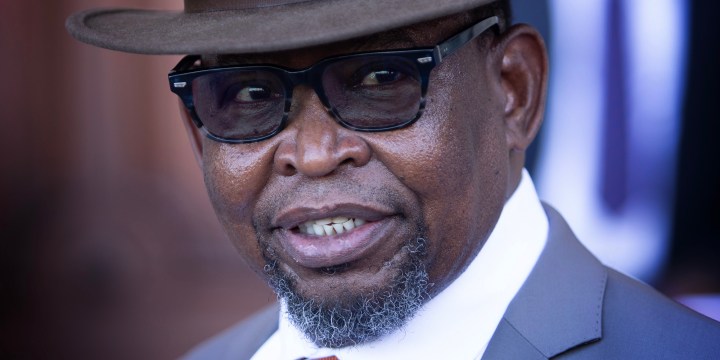FINANCIAL REPORTING LAWS
Godongwana permanently sinks Eskom’s controversial exemption

There was widespread criticism of Finance Minister Enoch Godongwana for signing a special Government Gazette on 31 March which would pave the way for Eskom to no longer disclose irregular, fruitless and wasteful expenditure over the next three years that did not arise from corruption.
Finance Minister Enoch Godongwana has permanently withdrawn Eskom’s exemption from some aspects of the Public Finance Management Act (PFMA) that require the power utility to disclose irregular, fruitless and wasteful expenditure in its annual report and financial statements.
Godongwana made the decision after concluding consultations with the Auditor-General and considering comments from the public, including submissions from the accounting and auditing profession.
There was widespread criticism aimed at Godongwana for signing a special Government Gazette on 31 March 2023, which would pave the way for Eskom to no longer disclose irregular, fruitless and wasteful expenditure over the next three years that did not arise from corruption.
Critics across the political and civil society spectrum argued that the exemption could be used by Eskom’s management and board to hide wrongdoing at the utility, which was a key site of State Capture corruption.
Following the backlash, Godongwana temporarily withdrew the exemption to have more consultations. He has now permanently withdrawn the exemption.
Granting the exemption, which Godongwana and the National Treasury described as “partial”, would have had the effect of Eskom not having an obligation to disclose irregular, fruitless and wasteful expenditure in its annual report and its financial statements — as required by the PFMA.
Irregular, fruitless and wasteful expenditure that occurs through criminal activity, such as theft and corruption, would still have had to be reported by Eskom in its financial statements. Other instances of irregular, fruitless and wasteful expenditure not linked to corruption, such as contraventions of day-to-day/ordinary accounting rules and the processes of recovering funds, would have needed to be be disclosed only in the annual report.
The state-owned transport group Transnet was recently granted a similar exemption, which still stands and will run for the next two years.
In a statement on Wednesday, the Treasury said Godongwana had decided to not grant Eskom a partial exemption, saying he recognised efforts by the power utility’s management and board to fight corruption while having to comply with the reporting burdens placed by the PFMA.
“However, it is the view of the Minister that Eskom needs to do more operationally to reduce the scope of fraud and corruption before such exemption can be considered, and for it to be effective.
“As Eskom attempts to recover from the devastating impact of state capture and take steps against past and current corruption, it needs to ensure that its anti-corruption strategy is credible and has the support of key stakeholders like investors, lenders, suppliers, customers, and the public,” the Treasury said.
Level playing field
Eskom and Transnet have argued that granting exemptions from the PFMA would help the state-owned enterprises (SOEs) to be on a level playing field with private sector companies, which are not subjected to the PFMA.
In addition to the PFMA, SOEs are bound by the Companies Act, the International Financial Reporting Standards, and JSE Debt Listings Requirements (their bonds/debt are listed on the JSE).
Eskom and Transnet have said that the PFMA is also cumbersome as the SOEs are required to include previously identified irregular and fruitless and wasteful expenditures in their latest financial statements — even if they have taken corrective and remedial action. The SOEs have also argued that the PFMA tends to confuse international investors, especially in the accounting treatment of financial statements.
In addition to engaging with the Auditor-General, Godongwana considered 56 public comments and had discussions with audit firms and professional auditing and accounting bodies.
Although irregular expenditure does not necessarily equate to fraud and corruption, the Treasury said, “many comments submitted view irregular expenditure as an indicator of how SOEs are managing their finances”.
Over and above Eskom having to comply with financial reporting laws, it will also face more scrutiny from the Treasury, which plans to take over a portion of its debt (or R254-billion), including not being allowed to increase its borrowings without approval from the Treasury.
Read more in Daily Maverick: Government comes to Eskom’s rescue by taking over R254bn of its debt
“The National Treasury remains committed to upholding the highest standards of financial governance in the management of Eskom’s finances and not compromising the ethos of the PFMA. Treasury will continue to assist Eskom to strengthen its mechanisms to prevent, detect and investigate any financial irregularities, and ensure that acts of fraud and corruption are fully and properly reported, regardless of the reporting requirements.
“The National Treasury remains of the view that SOEs are facing legitimate technical challenges regarding compliance reporting, and the need to differentiate between corrupt and suspicious transactions and expenditure made in good faith, but not necessarily complying with the plethora of financial and non-financial laws and rules,” it said. DM




















 Become an Insider
Become an Insider
Keeping accurate records is a basic reqirement that becomes difficult only when fancy footwork is required.
One reason for not declaring the irregular expenditure might be to not alert the thieves that you are on to them. But it’s a tricky manoeuvre and we’d all rather see transparency than half truths.
I reiterate: most of the significant corruption occurs during Government Procurement/Tendering.
Control this action by means of transparent Tender Board of select professional people and you largely cut of this lucrative source of corruption from the thieves.
Most 1st world countries employ this method to control and prevention corruption. And it works well.
Let’s insist that that the government institutes this asap.